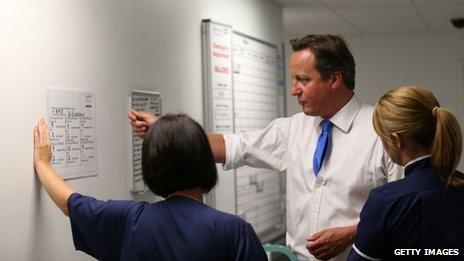Britons 'pay too much for private healthcare'
- Published
- comments

The thrust of government health policies for the best part of 20 years has been to encourage greater participation of the private sector in the NHS and to stimulate competition within the NHS.
Successive prime ministers from Tony Blair to David Cameron have tended to argue that everything would be alright in the NHS if only it could be as efficient and customer-friendly as the private sector.
Which is why it is somewhat resonant (ahem) that the Competition Commission has this morning produced what will be seen as a damning indictment of the purely private part of Britain's healthcare provision.
The watchdog says there is inadequate competition inside the private health market and that private health providers are ripping off consumers to the tune of between £173m and £193m a year (which the watchdog describes as a "conservative estimate" of the detriment).
The commission says that private operators of hospitals in many areas face inadequate competition. It identified 101 hospitals outside London with too much market power. And in London, it concluded that the US's HCA Inc - which is the world's biggest private healthcare group - is too strong. HCA has eight market-leading hospitals and other facilities in central London.
The watchdog says private health insurers are paying too much for the services provided by these private hospitals. Which matters because 80% of all private healthcare is funded by insurance policies, sold by the likes of Bupa and AXA PPP.
The watchdog complains that far too little information is provided to consumers on the performance of private hospitals and consultants. Which makes it impossible for those seeking treatment to shop around in a proper way.
And it dislikes the incentives the hospitals give to consultants - cash or access to consulting rooms and secretarial support - for making referrals to them. These incentives encourage consultants to recommend hospitals to patients on the basis of what suits the consultants, not what is in the interest of patients, says the commission.
What would be the remedies?

About the same number of people have private health insurance as in 1995
Well, it recommends forced sales of hospitals where this would improve competition - and its preliminary view is that these divestitures should be by HCA in London and by BMI and Spire elsewhere.
Such mandated disposals would be fatuous where a hospital has a total local monopoly, in that this would simply transfer ownership of the monopoly. So it wants to limit the pricing power of the bigger hospital groups by forcing them to negotiate deals with insurers on a hospital-by-hospital basis, rather than nationally.
The commission proposes publication of useful information on the performance of private hospitals and consultants, similar to information that is gradually being provided in the NHS.
And it suggests a ban on most incentives for consultants designed to encourage them to recommend particular hospitals.
The thrust of these reforms can be seen as trying to alter the balance of power away from the private hospital providers and towards the insurers and consumers.
What is striking is that the profitability of the hospital groups has risen sharply over the past few years, and - according to the commission - the return they make on their investment is more than double the cost of that investment. (In the jargon, return on equity is well over twice the weighted average cost of capital.)
All of which is symptomatic of inadequate competition.
But perhaps as relevantly, the private health insurance market is the same size as it was in 1995, by number of people covered - which the insurers put down to the rising cost of what they have to pay for medical services and then have to pass on to customers in higher premiums.
So the commission's proposed reforms seem designed to give the insurers more muscle in negotiations with the hospital groups.